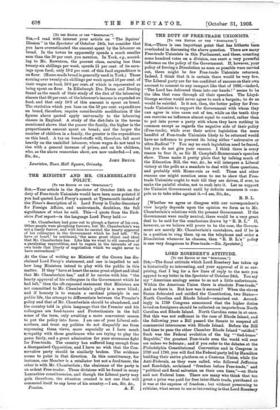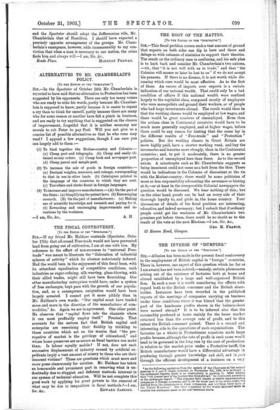LORD ROSEBERY'S ATTITUDE.
[To THE EDITOR OP THE " SPECTATOR."] SIR,—The fiscal attitude which Lord Rosebery has taken up is historically so interesting, and your approval of it so sur- prising, that I beg for a few lines of reply to the note you append to my letter in the Spectator of October 24th. You say my "American analogy seems to us not a little unfortunate. Within the American Union there is absolute Free-trade." And so there is. But how was it secured ? When the eleven States federated and ratified the Constitution, two States— North Carolina and Rhode Island—remained out. Accord. ingly in 1789 Congress announced that the higher duties levied on foreigners should be collected on imports from North Carolina and Rhode Island. North Carolina came in at once. But this was not sufficient in the case of Rhode Island, and the following year a Bill passed the Senate to suspend all commercial intercourse with Rhode Island. Before the Bill had time to pass the other Chamber Rhode Island " ratified." Such was the Federal evolution of the big " tied-house ' Republic," the greatest Free-trade area the world will ever see unless we federate ; and if you refer to the debates at the Philadelphia Constitutional Convention and in Congress in 1789 and 1790, you will find the Federal party led by Hamilton building their entire platform on a Customs .Union, while the Anti-Federals, as they were called, who followed Jefferson and Randolph, acclaimed "freedom before Free-trade," and " political and fiscal salvation on their own lines,"—on State and not. Federal lines. There are many who think that too great a price was paid for free inter-State trade, purchased as it was at the expense of freedom ; but without presuming to criticise, what seems to me so interesting is that Lord Rosebery
and the Spectator should adopt the Jeffersonian role, Mr. Chamberlain that of Hamilton. I should have expected a precisely opposite arrangement of the groups. Mr. Chain- " berlain's emergence, however, adds immeasurably to my con- viction that when a man is necessary to our nation, the crisis finds him and always will.—I am, Sir, &e.,



















































 Previous page
Previous page